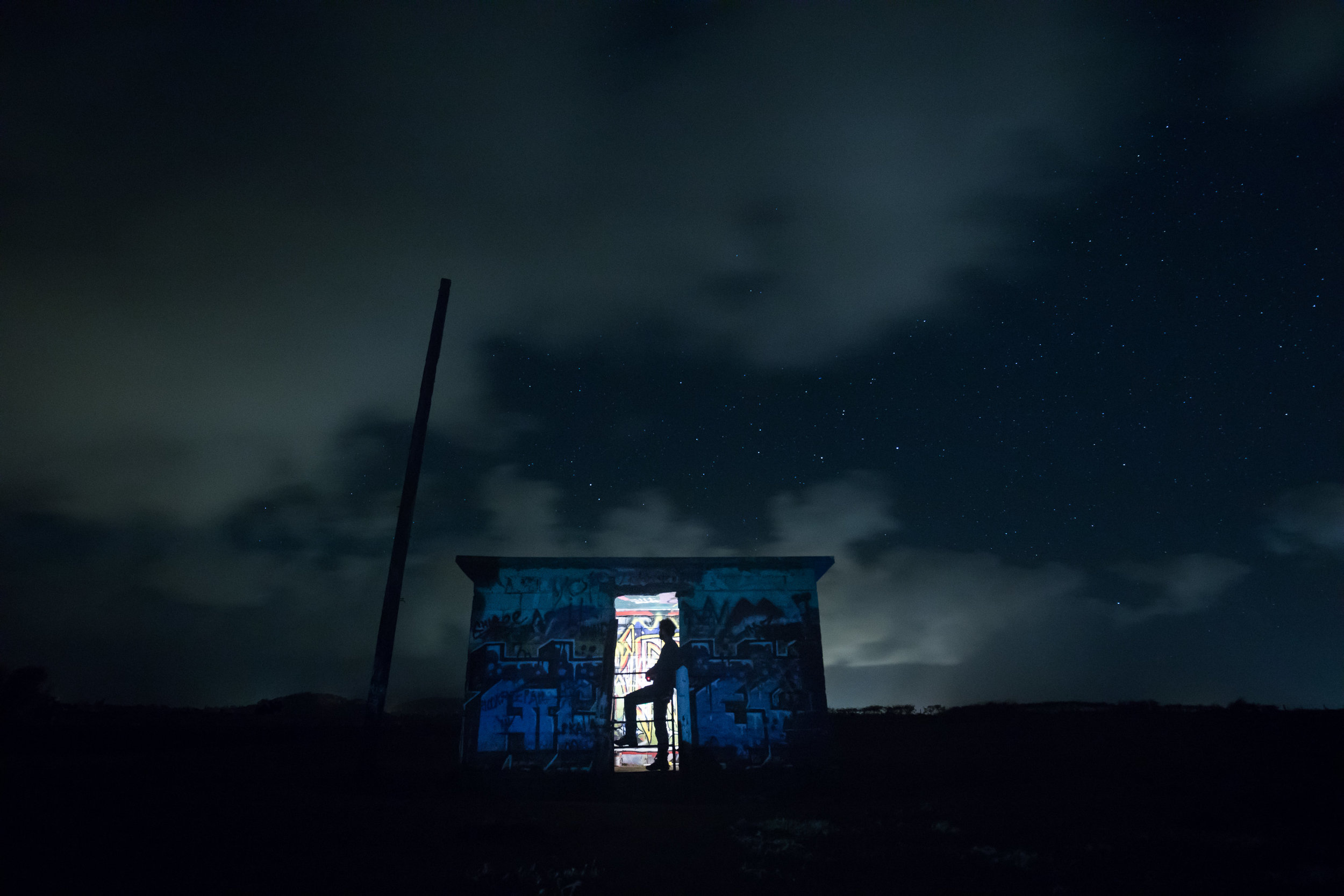Silent Nights

I woke up in a panic. Inside my 20-degree sleeping bag covered by my 10-degree bag covered by a wool blanket. Somewhere in my van in the Yukon Territory. Gasping for air… choking… heart racing. My mind begged for help, and that’s when it hit me – there was no help here. No help! I was completely alone.
No one would know if I died in my van in this snow-filled provincial park that hadn’t seen a soul in months. No one would know because, as a stubborn purist, I was traveling without a cell-phone through Canada. No hospital for hundreds of miles, hadn’t spoken to anyone about my location in days. A normal day for our ancestors, a very abnormal day for us.
I probably choked on my sleeping bag that night, I still don’t know. What I know is that night messed me up. Big time. I was eight months into what would become a two-year solo road trip, one I took partially to feel the intoxication of solitude – that direct line of heavenly communication with yourself and the universe. The ultimate freedom. I hadn’t expected my desire for solitude to come with a solid serving of fear.
Silence is Solitude
Everybody does vanlife differently. My goal was to camp in the sticks each night. Miles and miles down rutted-out, washboard roads. I’d smile when I’d see some switch-backy road called FR2103 on my Delorme paper map. Even better if it petered out atop a hill, deep into a green section on the map. That’s home.
Most nights, silence was my only companion. I spent enough years falling asleep to the sounds of city horns, drunken bowel releases, and upstairs lovers. I craved silence.
But silence really surprised me. It was a damn ringing in my ears that wouldn’t go away. It’s just us buddy, no distractions. Riiiiiiiiiing. So few of us ever really hear (and sit with) the sound of silence anymore, that, at first, it scared me. Riiiiiiiiiing. Shut the windows, lock the doors! Who knows what’s lurking in the 3AM moon shadows. Riiiiiiiiiing. Isn’t that noise supposed to go away when I shut all the van doors? Riiiiiiiiiing.
I camped in places city folks would give up their year-end bonuses to sleep on a Monday night. And I was locked inside my van. I felt so guilty. And so lame. But after some time (a lot of time, in fact) I grew to love the sound of silence. I needed about six months for it to feel somewhat normal.
By now, you’re probably asking yourself: this sounds awful, why go through this? Why pursue solitude and risk being lonely, in the silence, in the dark?
Here’s what I would say to that: two years of solitude taught me things about myself that I could only learn by being alone. I’d like to share some of those anecdotes with you, aided by the work of well-known psychologists and psychiatrists.
Being Alone, Not Necessarily Being Lonely
Almost everyone who learned I was living alone in my van asked me, “Well, don’t you get lonely?” Well, yes, but that’s a choice. At any time, I could go visit a friend or make a new one, yet, often, I found myself choosing loneliness. I did this because I was still getting something valuable out of solitude.
A point is usually reached within a solitary experience where loneliness becomes the overriding emotion. It took me about one year and six months to realize my life on the road had shifted – from one primarily of joyous solitude, to one primarily of empty loneliness. Do you know the point where solitude turns to loneliness for you? If not, I encourage you to explore that question. Because only at that point have you used up all the energy and self-discovery that solitude provides, described below.
Essential to Being Yourself
I like parties. I love conversation. If you met me, you may describe me as gregarious… a total extrovert. You would be right and wrong. While I do have a wildly social spirit, there is (at least) an equal part of me that derives energy and inspiration from being alone. One of the reasons I get enjoyment and clarity from writing and landscape photography. In solitude, I find ways of expressing my true self, which can only be done without another human in mind.
Introverts and extroverts are known to have wild self-discoveries in solitude – discovering secrets about their personality, purpose, and strengths that remain elusive in social situations. Solitude confirmed that my interest in nature was more than an interest. It was a life purpose – to protect it any way I can.
In an overly-socialized world, we need more solitude to drown out the noise, and really hear our voices deep within. Perhaps you’re on track, perhaps you’re not. Some solitude will help you get closer to your true self.
"People often express the idea that they are most themselves when they are alone; and creative artists especially may believe that it is the ivory tower of the solitary expression of their art that their innermost being finds its completion." - Anthony Storr, Solitude: A Return to the Self
“We become much more free of other people, which in turn means that we become much more ourselves, our Real Selves (Horney), our authentic selves, our real identity.” - Abraham Maslow, The Farther Reaches of Human Nature
A Place Where You Can Draw Immense Energy and Focus
Some journalists call us Generation Adderall. Used for focus, productivity, and well, maybe because it feels good. Forget that – I say try solitude. It’s the best focus drug I’ve ever found. So much so, that some offices are finally getting a clue and installing sound-proof work stations.
Solitude is a practice. At first you’re going to be as fidgety as a hummingbird, hunting for every distraction to get away from yourself. But once you settle into you, whoa… bring on the focus and inspiration.
“The sense of perfect harmony with the universe, of perfect harmony with another person, and of perfect harmony within the self are intimately connected. Experiences of this kind can occur spontaneously in solitude without the aid of any external stimulus. Such transcendental experiences are closely connected with aspects of the creative process; with suddenly being able to make sense out of what had previously appeared impenetrable, or with making a new unity by linking together concepts which had formerly seemed to be quite separate.” - Storr, Solitude
A Reboot For Your Imagination
Imagination. Freedom of the mind. Most of us were encouraged to have an active imagination as a kid, but somewhere along the way, our imaginations have probably become less active. Using solitude as a time for active imagination can help you rediscover innate passions and avoid depression, among other things.
“Often Middle-age patients suffering from depression are people who, because of the demands of their careers and families, have neglected or abandoned pursuits and interests which, at an earlier point in time, gave life zest and meaning. If the patient is encouraged to recall what made life meaningful to him in adolescence, he will begin to rediscover neglected sides of himself, and perhaps turn once again to music, or to painting, or to some other cultural or intellectual pursuit which once enthralled him, but which the pressure of life’s business had made him abandon.” - Storr, Solitude
“Sentiment without action is the ruin of the soul.” - Ed Abbey
Break Irrational Fears and Build Self-Reliance
We all grow up, but we aren’t necessarily forced to deal with fears from childhood. Completely outdated fears still rattle around inside us all. I’m a weirdo (in many ways), but specifically because I like to identify my irrational fears and break them (partially why I placed myself into so many nights of silent darkness).
Solitude – without any societal influence – helps me question whether I believe my fears, or whether they’ve been planted in my brain – unchallenged – from external sources.
For me, pushing against irrational fear reminds me that the world is almost entirely a welcoming, good, safe place, full of very nice people. Knowing this gives me the confidence to have diverse experiences, to take risks, to live and build self-reliance. Solitude is an completely open space for questioning irrational fears.
Look, you definitely don’t need to live in a van for 2 years by yourself to gain perspective from solitude. However, I believe it’s worth a focused effort to make time for solitude. It will never just happen. With all the catchy adventure tales circulating around the internet these days, I hope take some time alone (preferably in the woods) to explore yourself. I hope you get to know solitude as a friend… and really get to know yourself.
“When from our better selves we have too long
Been parted by the hurrying world, and drop,
Sick of its business, of its pleasure tired,
How gracious, how benign, is Solitude.”
- William Wordsworth, The Prelude: The Complete Poetical Works of William Wordsworth







